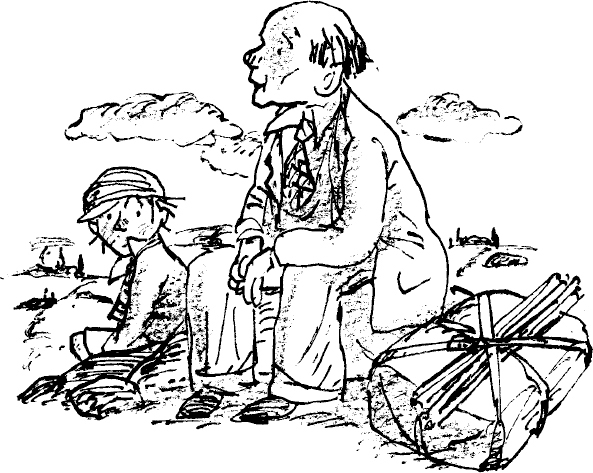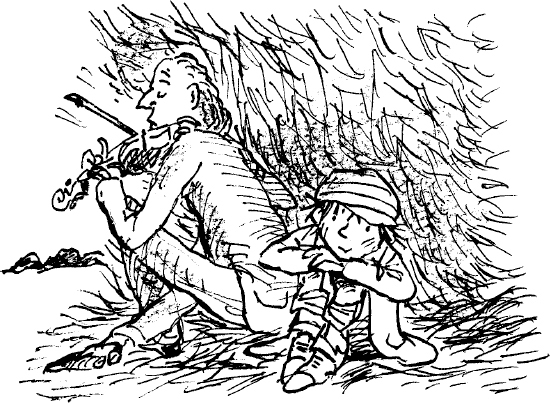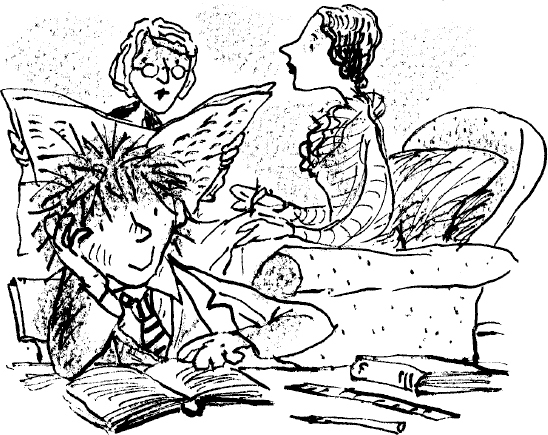William sat on the crest of the hill, his chin cupped in his hands. He surveyed the expanse of country that swept out before him and, as he surveyed it, he became the owner of all the land and houses as far as he could see.
Finding the confines even of England too cramping for him, he became the ruler of the whole world.
He made sweeping and imperious gestures with his right arm – gestures that sent his servants on missions to the farthest ends of the earth.
It was at this point that William realised he was not alone. A small man had climbed the hill and now sat watching him with interest. Near the small man was a large pack.
“Well, did you catch it?” said the small man pleasantly, as William turned to meet his eye.
“Catch what?” said William.
“The mosquito. I thought you got him that last grab.”
“Yes, I got him all right,” said William coldly. He swept his arm around in another circle and added, “All that land belongs to me. It’s mine as far as you can see.”
The man had a brown, humorous but sad face. He looked impressed.
“But you’re under age, of course. I suppose you have a guardian or an agent of some sort to manage it for you.”
“Oh yes,” said William. “Oh yes, I have a guardian or agent all right.”
“Your parents are both dead, of course?” the man said.
“Oh yes,” said William. “Oh yes, my parents are both dead all right.”

“And where do you live?”
The most imposing house within sight was the Hall.
William pointed to it.
“I live there,” he said.
As a matter of fact, the Hall was rather in the public eye at present. Mr Bott (of Bott’s Sauce) lived there, and Mrs Bott had recently given a staggering subscription to the rebuilding of Marleigh Cottage Hospital.
The result of this was that the Chairman of the Hospital, Lord Faversham, was coming down from London to attend a party at the Hall to which the entire neighbourhood – including the Browns – was invited, and which was to assure for ever Mrs Bott’s place among the neighbouring aristocracy.
William had heard nothing else mentioned in the village for days past.
“I’m giving a large party there next Friday,” he said nonchalantly. “Lord Faversham’s coming to it, and a lot more dukes and earls and things.”
William suddenly caught sight of a little dog lying on the ground behind the pack, fast asleep.
“I say,” he said, “is that your dog?”
“Yes,” said the little man, “it’s Toby. Wake up, Toby. Show the gentleman what you can do, Toby.”
Toby woke up and showed the gentleman what he could do. He could walk on his hind legs and dance and shoulder a stick and pace up and down like a sentry. William watched him ecstatically.
“I say! I’ve never seen such a clever dog!”
“Never was such a dog,” said the little man. “But do people want him? No. Punch and Judy’s out of date, they say. I don’t know what the world’s coming to.”
William’s eyes opened still further.
“You got a Punch and Judy show?” he said.
The man nodded and pointed to his pack on which the faded letters “Signor Manelli” could be faintly seen.
“Yes,” he said. “Same as my father before me, though my father never had a dog like Toby.”
He was actually an Italian, he said, and had come to England with his father and mother when he was only a few weeks old.
He had never been out of England since, but his ambition was to make enough money to go back to Italy to his father’s people. It was an ambition, however, that he had almost given up hope of fulfilling.
“Well, I like Punch and Judy,” said William, “and if—”
The little man interrupted him, his soft, brown eyes shining. “Listen,” he said, “this party you’re giving on Friday. Couldn’t you engage us for that? I promise that we’d give you our best performance.”
“Er – yes,” said William flatly. “Yes, of course.”
“I’ll come then? What time does the party begin?”
“Er – three o’clock,” said William, struggling with a nightmarish feeling of horror. “But I’m afraid – you see – I mean—”
“I promise you I won’t disappoint your guests. You won’t regret it. I thank you from my heart.”
He had leapt to his feet and was already shouldering his pack.
“Three o’clock on Friday,” he said. “I’ll not disappoint you.”
Already he was swinging down the hill.
“But – look here – wait a minute . . .” William called after him, desperately.
But the little man was already out of sight and earshot.
During the next few days William lived in a double nightmare, of which the subject was sometimes the little man arriving full of hope and pride at the Hall on Friday and being summarily dismissed by an enraged Mr Bott, and sometimes himself on whom the hand of retribution would most surely fall.
“They’re going to have an entertainment,” his mother said at breakfast one morning.
“What sort of entertainment?” said William hopefully.
“Zevrier, the violinist,” said Mrs Brown. “He’s really famous, you know. And terribly modern.”
“I wonder if . . .” said William tentatively. “I mean, don’t you think people would rather have a Punch and Judy show than a violinist?”
“A Punch and Judy show? Don’t be so ridiculous, William. It’s not a children’s party.” By the time Friday actually arrived, however, William’s natural optimism had reasserted itself. The little man had, of course, taken the whole thing as a joke and would never think of it again.

Still, as William wandered about among the guests, he kept an anxious eye upon the entrance gates.
Lord Faversham, wearing an expression of acute boredom, was being ushered by a perspiring Mrs Bott into the tent where Zevrier’s recital was to take place. Then Mrs Bott went to the door to look up and down anxiously for Zevrier.
The tentful of people began to grow restive. It was quarter-past three. The audience didn’t particularly want to hear Zevrier, but it had come to hear him and it wanted to get it over.
Mrs Bott, whose large face now rivalled in colour her husband’s famous sauce, went into the library where her husband had sought temporary refuge with a stiff whisky and soda.
“Botty, he’s not come,” she said hysterically.
“Who’s not come?” said Mr Bott gloomily.
“Zebra, the violin man. Oh, Botty, what shall I do? They’ll all be laughing at me. Oh, Botty, isn’t it awful!”
Mr Bott shook his head. “I can’t help it,” he said. “You would have all this set-out. I warned you it wouldn’t come to no good.”
“But, Botty, there they are, all waiting, an’ nothing happening! Can’t you do something, Botty?”
“What can I do? I can’t play the vi’lin . . .”
Meanwhile, outside the tent, William had turned to see a small, pack-laden figure approaching. His heart froze within him.
“Ah, my little host, I am so sorry to be late. The bus broke down. Ah, here are your guests all ready for me. I will waste no more time . . .”
Still speaking, he entered the tent, mounted the little platform that had been prepared for Zevrier, and began to set up his miniature stage.
William stood for a moment, rooted to the ground by sheer horror, then, his courage suddenly failing him, began to run down the drive and along the road that led to his home.
But just as he was rounding the corner of the boundaries of the Hall estate, he ran into the strange figure – a figure wearing an open collar, flowing tie, and shock of long, carefully waved hair. It carried a violin-case. There was no doubt at all – it was Zevrier.
William was going to hasten past, when he noticed the musician’s expression – ill tempered, querulous. He remembered the appealing, rather helpless friendliness of the little Punch and Judy man. He imagined the inevitable clash between them.
Again the nightmare closed over him.
“Er – please,” he began incoherently.
The musician stopped short and scowled at him. “Yes?”
“Er – are you going to the Hall?”
“Yes,” snapped the musician.
“To play to them?”
“Yes.”
“Are you Mr Zevrier?”
“I’m Zevrier,” said the man, tossing back his hair and striking an attitude.
“Well – well – I wouldn’t go to play to them if I was you.”
“Why not?” snapped the musician.
William silently considered this question.

“Well, I wouldn’t,” he said mysteriously, “if I was you. That’s all.”
The musician was feeling particularly annoyed that afternoon. He was engaged in writing his autobiography, and he could not find anything interesting to put into it. He wanted it to abound in picturesque episodes, and he couldn’t find even one picturesque episode to put into it.
Moreover, he disliked Mrs Bott, though he had never met her. She began all her letters to him, “Dear Mr Zebra”.
“Pigs!” he burst out suddenly. “Buying immortal genius by the hour, as if it were tape at so much a yard.”
“Yes,” said William, “yes, that’s just what I think about it.”
“You!” said the musician, glaring at him. “How can you understand?”
“I do understand,” said William fervently. “I – well, I do understand. I mean, you tell me a bit more what you feel about it. I – I mean, I want to know what you feel about it.”
William’s attitude was that every word postponed the inevitable moment of reckoning.
“You – you don’t know what music is to me,” said the musician striking his chest dramatically.
“Yes, I do,” said William.
Experience had taught him that with a little care and skill, any argument can be prolonged almost indefinitely.
“You don’t love music.”
“Yes, I do.”
“It isn’t – life and breath to you.”
“Yes, it is.”
The musician looked at William closely. William’s expression was guileless and innocent. He could not know, of course, that William was probably the most unmusical boy in the British Empire.
“Suppose,” said the musician, tossing back his long hair, “suppose I played to you instead, would it be something that you’d remember all your life?”
“Yes,” said William, fixing an idiotic smile upon his lips.
“I will,” said the musician, already beginning to compose the episode – with picturesque additions – in his mind. “Let us go—”
His gaze rested on a haystack in a field next to the road. That would look well in a book of memoirs. Perhaps some artist would even be inspired to paint the scene. With an idealised boy, of course.
“Let us go there.”
Arrived at the haystack, he sat down in the shade of it, with William next to him, and drew out his violin.
He played for a quarter of an hour. Then he looked at William. William sat with a look of rapt attention on his face.
The musician could not know, of course, that in sheer boredom William had returned to his role of world potentate and was engaged in addressing his army on the eve of a great battle.
He played again, then again he looked at William.

“Another one,” said William in a peremptory tone of voice that the musician took to be one of fervent appreciation.
He could not know, of course, that William was now a pirate, and was ordering his men to send yet another captured mariner along the plank.
He played again, then again looked at William. William’s eyes were closed, as if in ecstasy.
He could not know, of course, that William was asleep.
He played again. The clock struck six. William sat up and heaved a sigh of relief.
“I’ve got to go home now,” he said. “It’s after my tea-time.”
The musician glanced at him coldly and decided that the boy should make quite a different sort of remark in his memoirs.
They went back to the road in silence, and there parted – William to his home, and the musician to the station.
Mrs Bott, now on the verge of hysterics, went slowly down to the tent. To her amazement, a burst of loud laughter and clapping greeted her. She peeped in at the open flap. A Punch and Judy performance was in full and merry swing!
“I’m dreaming,” she said. “Where’s Zebra? Where did this thing come from?” Her eyes went to the noble lord. He was leaning forward in his seat, laughing uproariously.
After the first moment’s stupefaction, everyone else had settled down to follow his example and enjoy the show. Signor Manelli was a born comedian. Toby carried his little sword with swagger.
“What’s happened?” murmured Mrs Bott wildly. “I’ve gone potty.”
But the performance was drawing to a close, amid a riot of applause. The noble lord had mounted the platform and was shaking Signor Manelli by the hand.
“Bravo!” he was saying. “I’ve not enjoyed anything so much for years. Not for years. Now, look here, I want to book you for a party at my place in town next month. Have you a free date?”
It appeared that Signor Manelli had a free date. A fee was named, at which Signor Manelli almost fainted in sheer surprise. Suddenly the noble lord saw Mrs Bott.
“Ah!” he said genially. “Here is our hostess, to whom we owe this delightful entertainment.”
Signor Manelli started forward to her eagerly. “And where is my little host?”
The mystery was suddenly clear to Mrs Bott. Botty must have engaged this man for her to fall back on, in case the Zebra person didn’t turn up. It was just like Botty to do a thoughtful thing like that and not mention it.
“He’s resting in the library,” she said.
“I won’t disturb him then,” said Signor Manelli, “but give the dear little man my most grateful respects, and tell him that I shall never forget his kindness to me.”
“Yes, I’ll tell him,” said Mrs Bott, and was at once surrounded by an eager crowd congratulating her on the success of her entertainment.
To her amazement, Mrs Bott discovered that her party had been a roaring success and that she was at last, “somebody”.
When her guests had departed, she sought out her husband in the library.
“Oh Botty,” she said hysterically, “how kind, how thoughtful of you to think of it. I shall never forget it – never.”
He laid his hand gently on her shoulder. “You go and lie down, my dear,” he said. “The excitement’s gone to your head . . .”
The Browns were walking slowly homeward.
“I didn’t see William there, apart from at first, did you?” said Ethel.
“He must have been there somewhere,” said Mrs Brown. “I’m sure he loved the Punch and Judy show.”
It was several months later. William sat at the table ostensibly engaged upon his homework. Mrs Brown was reading the paper and keeping up a desultory conversation with Ethel, who was embroidering a nightgown.
“It says that Punch and Judy is still all the rage in London,” said Mrs Brown, “but that Signor Manelli, who started it, is taking no more engagements because he’s going back to Italy. Do you remember him, dear? We saw him at that party of Mrs Bott’s.”

“Yes,” said Ethel.
“And here’s something about that Mr Zevrier, the musician that Mrs Bott once thought of having to her party, you know, before she decided to have the Punch and Judy . . .”
“What?” said Ethel absently.
“His book of memoirs has just been published. And it quotes an extract from it here. All about a musical child that he met when he was going to play at some sort of party and he stayed playing to it, and forgot the party and his fee and everything.”
She looked up.
“I wonder – you know, people said that Mrs Bott had engaged him for her party, as well as the Punch and Judy show, and he didn’t turn up. Could it have been here that he met this musical child?”
“What sort of child was it?” said Ethel.
“It quotes a description from the book,” said Mrs Brown. “Here it is: ‘He had deep-set, dark eyes and a pale, oval face, sensitive lips, and dark, curly hair. I saw at once that to him, as to me, music was the very breath of life.’”
Ethel laughed shortly. “No, it couldn’t have been here,” she said. “There isn’t a child like that about here.”
His head shielded by his hands in the attitude of one who wishes to devote himself entirely to study and shut out all disturbing influences, William grinned to himself . . .